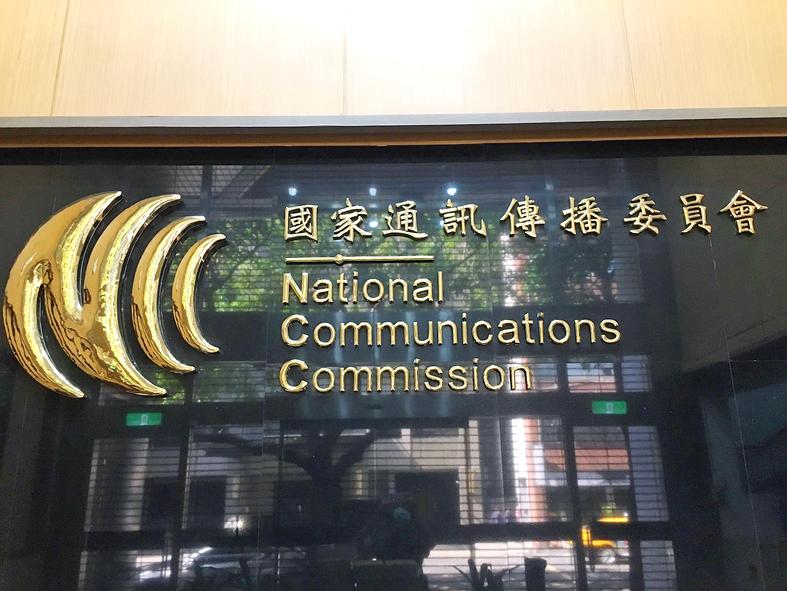The National Communications Commission (NCC) is not pushing a controversial draft digital intermediary service act to the Legislative Yuan, the commission said yesterday, adding that suggested changes to the bill are welcome.
“The draft act has yet to be finalized by NCC commissioners, and has not been delivered to the Executive Yuan or the Legislative Yuan for further review. Therefore, there is no need to withdraw it,” the commission said in a statement.
“Issues related to the Internet are complicated and often come under close scrutiny. The NCC is open to any suggestion from the public,” it added.

Photo: Yang Mien-chieh, Taipei Times
The commission issued the statement following calls from politicians and media experts to drop the draft, which they said could impede online speech freedoms by expanding the government’s authority to flag content.
Some Chinese-language news outlets said the NCC was aggressively pushing the bill regardless of problems identified by civic groups, media experts and industry specialists in three information sessions that the commission has held so far.
The NCC on Friday said it would postpone a public hearing on the draft that was initially scheduled for Thursday, saying “it needs time to thoroughly research, analyze and discuss a variety of issues that were raised at the information sessions.”
“We will resume our communication with the public after making improvements to the draft,” it added.
The draft that it presented to the public on June 29 is a proposal to generate input, the NCC said.
Suggested changes to the draft are to be cautiously assessed, it said, adding it did not push for passage of the first draft of the act, as some have claimed.
“We will continue to listen to opinions from all stakeholders, such as the types of intermediary service providers that should be regulated and how they should be regulated,” it said, adding that postponing Thursday’s public hearing was necessary.
“As an independent agency, we understand that any policy will not be well-rounded and complete without coordination and communication with the Executive Yuan, Legislative Yuan and civil society,” it said.
The draft act was proposed to outline ways to handle problems that have arisen from a rapid development of Internet services, it said.
Cybercrimes — including non-consensual photo sharing, Internet fraud and disinformation — have hurt Taiwanese, particularly women and children, it said.
“We drafted the digital intermediary service act based on the EU’s Digital Services Act. It is our hope that the rights of Internet users can be protected by building an accountability mechanism comprising service providers, the public and the government,” the commission said.
“Freedom of speech is a constitutionally protected right in Taiwan, and its most treasured asset, and we need to carefully tread a fine line between protecting free speech and curbing cybercrimes. Rational discussion among stakeholders is conducive to a feasible policy,” it said.
The commission on Friday also said it would take into account the needs of intermediary service providers who are socially responsible but have problems fulfilling obligations the commission stipulated due to relatively small operating budgets.
Obligations for nonprofit or smaller service providers could be waived or eased, the commission said.

A preclearance service to facilitate entry for people traveling to select airports in Japan would be available from Thursday next week to Feb. 25 at Taiwan Taoyuan International Airport, Taoyuan International Airport Corp (TIAC) said on Tuesday. The service was first made available to Taiwanese travelers throughout the winter vacation of 2024 and during the Lunar New Year holiday. In addition to flights to the Japanese cities of Hakodate, Asahikawa, Akita, Sendai, Niigata, Okayama, Takamatsu, Kumamoto and Kagoshima, the service would be available to travelers to Kobe and Oita. The service can be accessed by passengers of 15 flight routes operated by

MORE FALL: An investigation into one of Xi’s key cronies, part of a broader ‘anti-corruption’ drive, indicates that he might have a deep distrust in the military, an expert said China’s latest military purge underscores systemic risks in its shift from collective leadership to sole rule under Chinese President Xi Jinping (習近平), and could disrupt its chain of command and military capabilities, a national security official said yesterday. If decisionmaking within the Chinese Communist Party has become “irrational” under one-man rule, the Taiwan Strait and the regional situation must be approached with extreme caution, given unforeseen risks, they added. The anonymous official made the remarks as China’s Central Military Commission Vice Chairman Zhang Youxia (張又俠) and Joint Staff Department Chief of Staff Liu Zhenli (劉振立) were reportedly being investigated for suspected “serious

Taiwanese and US defense groups are collaborating to introduce deployable, semi-autonomous manufacturing systems for drones and components in a boost to the nation’s supply chain resilience. Taiwan’s G-Tech Optroelectronics Corp subsidiary GTOC and the US’ Aerkomm Inc on Friday announced an agreement with fellow US-based Firestorm Lab to adopt the latter’s xCell, a technology featuring 3D printers fitted in 6.1m container units. The systems enable aerial platforms and parts to be produced in high volumes from dispersed nodes capable of rapid redeployment, to minimize the risk of enemy strikes and to meet field requirements, they said. Firestorm chief technology officer Ian Muceus said

Alain Robert, known as the "French Spider-Man," praised Alex Honnold as exceptionally well-prepared after the US climber completed a free solo ascent of Taipei 101 yesterday. Robert said Honnold's ascent of the 508m-tall skyscraper in just more than one-and-a-half hours without using safety ropes or equipment was a remarkable achievement. "This is my life," he said in an interview conducted in French, adding that he liked the feeling of being "on the edge of danger." The 63-year-old Frenchman climbed Taipei 101 using ropes in December 2004, taking about four hours to reach the top. On a one-to-10 scale of difficulty, Robert said Taipei 101